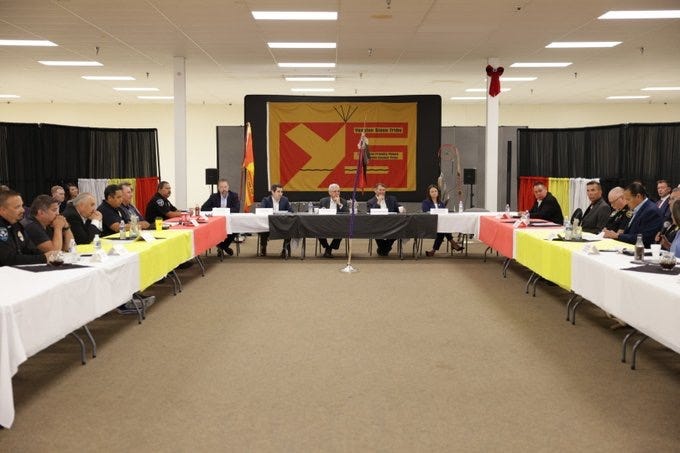Nine tribal nations invited to follow-up meeting with DOJ to address plague of crime
Meeting follows Attorney General Merrick Garland's August trip to South Dakota

South Dakota’s nine Native American tribes are invited to attend multiple meetings with Department of Justice officials as they examine better ways to help fund public safety on the reservations.
The U.S. Department of Justice announcement last week comes after Attorney General Merrick Garland held a roundtable with tribal leadership on the Yankton Sioux Reservation focused on improving public safety in Indian Country. The feds assembled a workgroup aimed at “examining options for improving funding opportunities for tribes, including consideration of potential legislative proposals.” As part of that, they are looking at ways to change the funding mechanisms used to support public safety programs and to make them more accessible to the nation’s tribes.
NEWS: Parent pushback as delayed threat notification spurs new Stanley County School District policy
“This working group identified several suggestions the department has received from tribes and advocates on potential pathways for improvement,” a memo to the state’s tribal leaders reads.
Garland’s meeting in Wagner earlier this year marked the first time that a sitting attorney general had visited the Rushmore State since 2011. It came at the invitation of Sen. Mike Rounds, whose office told The Dakota Scout that representatives from the state’s nine tribes indicated a desire to discuss concerns about crime plaguing many of the state’s reservations.
South Dakota tribes have declared states of emergency and two of them are suing the federal government, arguing the government has not provided enough funding to meet public safety obligations.
In his roughly three-and-a-half years as head of the department, Garland said the DOJ had given tribal governments in South Dakota $19.1 million to support tribal public safety initiatives.
“Tribal communities deserve safety and justice,” he told the public during a media appearance in Sioux Falls.
The series of meetings, slated to begin in Oct. 22, will not be open to the media so as to provide for the “confidentiality” of items that may be discussed during the meetings. The first one will take place in Anchorage, Alaska - with two more being virtual, and a final one in Sante Fe, New Mexico Nov. 19-21. Tribal leaders who are unable to attend are encouraged to provide written testimony.
Rounds called the meetings “a good first step” toward restoring law and order on reservations.
“The Department of Justice has heard the concerns of tribal leaders in South Dakota and is taking steps to address the public safety crisis,” Rounds wrote on social media. “I sincerely thank all of the tribal leaders who participated in our roundtable with the attorney general.”
NEWS: Digitization of case files opens space for mock courtroom in Minnehaha County























I don't know whether the claim that most missing or murdered indigenous women are victims of indigenous men is true or not, but does it lessen the need to address it? Most crimes against whites in South Dakota are committed by whites--pretty sure that's true, so is this honesty and clear identification of who is at fault a big help? Long ago a chief of police told me that the one common denominator of those in prison wasn't skin color or poverty or ethnicity, it was a lack of education. Would a focus on improving educational outcomes in the state help? I can hear the outcry already--we can't afford to spend any more effort or money on education! My point is that discussing what might be done and making some attempts to better deal with crime and public safety seems like a worthwhile endeavor--thanks to those politicians attempting to deal with it.
"In his roughly three-and-a-half years as head of the department, Garland said the DOJ had given tribal governments in South Dakota $19.1 million to support tribal public safety initiatives." So if I understand this correctly $Billions for Ukraine and Israel and chump change for problems in SD in areas where the federal government has treaty responsibilities. Just what are the priorities of the Biden administration and many US politicians in both parties? Why do many politicians get votes from citizens they show little regard for when it comes to spending taxpayer dollars?